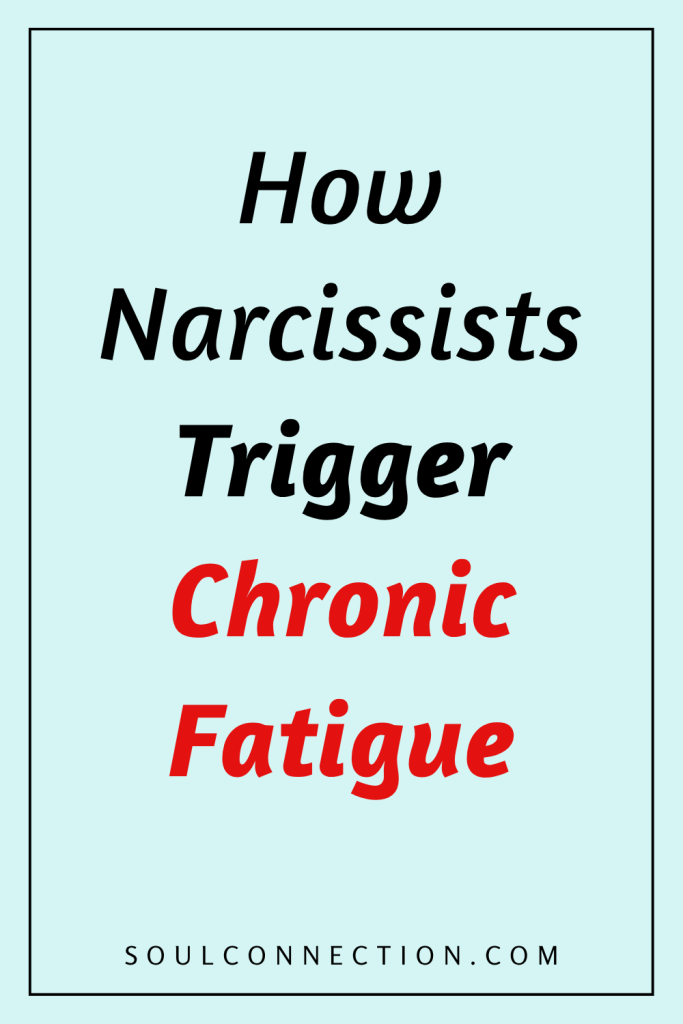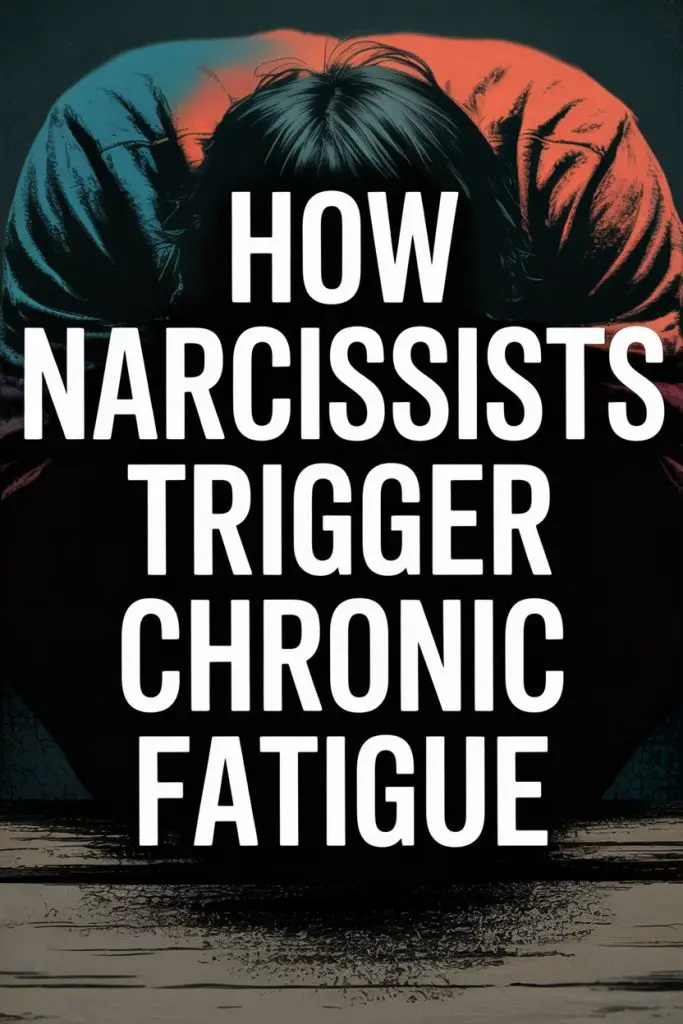Ever wondered why being around a narcissist feels like running a marathon in a desert, barefoot, with a squirrel taped to your back? Not just emotionally, but physically—down to your bones—exhausting?
Turns out, that’s not just your imagination or your mother’s flair for hyperbole. The connection between narcissistic abuse and chronic fatigue isn’t just real, it’s more common than you might think.
Let’s unpack how chronic fatigue can sneak in when a narcissist is running circles around your sanity.
Emotional Manipulation: The Energy Vampire in Action
Narcissists have a flair for twisting reality, leaving you questioning your own memory, sanity, and occasionally, whether you even like olives.
Gaslighting, blame-shifting, and the ever-popular silent treatment aren’t just mind games—they’re marathon events for your nervous system.
Dealing with this endless manipulation puts your body into a fight-or-flight mode. Adrenaline surges, your heart thumps, and your brain works overtime to interpret mixed signals.
Eventually, your body gets tired of sprinting after impossible standards and collapses into exhaustion. That’s not laziness—it’s your brain waving a tiny white flag.
Chronic Fight or Flight: Why Your Body Feels Like It’s Seen a Bear
Living with a narcissist means living with unpredictability. One minute, you’re the golden child; next, you’re the resident villain.
This emotional whiplash keeps your cortisol (the stress hormone) pumping, as if you’re being chased by a bear wearing your ex’s cologne.
Cortisol is meant for emergencies, not decades-long relationships. When your stress response never gets to clock out, it wrecks your immune system, sleep, and energy production.
Chronic fatigue creeps in, leaving you slogging through each day like a zombie in yoga pants.
Sleep Sabotage: When Rest Becomes a Distant Memory
If you’re tangled up with a narcissist, odds are good that sleep is a rare delicacy, like a unicorn frappuccino or a clean kitchen floor.
Rumination takes over as you replay arguments, anticipate the next outburst, or try to decipher those “accidentally” hurtful comments.
Even when you do sleep, it’s rarely restful. Anxiety keeps your sympathetic nervous system buzzing, so you wake up groggy, achy, and somehow, even more tired than when you went to bed.
Chronic fatigue isn’t just about not sleeping enough—it’s about never getting restorative sleep.
Hypervigilance: Living Life on Red Alert
Always waiting for the next shoe to drop? Welcome to the neighborhood. Narcissists train you to walk on eggshells, tuning your senses to every sigh, glare, or passive-aggressive comment.
This hypervigilance eats up mental and physical energy faster than a toddler with a bag of Skittles.
Hypervigilance isn’t just exhausting—it’s physically draining. Muscles tense, digestion slows, and your body never gets a chance to relax. Over time, this leads to aches, headaches, and—you guessed it—chronic fatigue.
Guilt and Shame: The Emotional Energy Sinkhole
A narcissist’s specialty is making you feel like everything is your fault. Didn’t read their mind about the salad dressing? Clearly, you don’t care enough. Forgot to text back in five minutes? Evidence of your selfishness.
Constantly carrying guilt and shame is like lugging around an invisible rucksack filled with bricks. Self-doubt and self-blame drain your motivation, making even basic chores feel Herculean.
Chronic fatigue isn’t just “in your head”—but guilt certainly knows how to camp out there.
Social Isolation: When Support Gets Cut Off
Narcissists love to isolate their partners from friends and family. No witnesses, no help, no escape. The less support you have, the harder it is to recharge your batteries.
Humans thrive on connection. Without it, stress multiplies, loneliness sets in, and the exhaustion deepens.
Chronic fatigue worsens because you’re stuck doing damage control solo, with no one to remind you that you’re not, in fact, as hopeless as your partner claims.
Emotional Labor: Doing All the Work, Getting None of the Credit
Relationships with narcissists run on emotional labor—listening, accommodating, fixing, apologizing, mediating, and occasionally, performing mental gymnastics worthy of an Olympic medal.
This constant effort, without reciprocity, leaves you tapped out. It’s hard to feel energetic when you’re managing not just your own feelings, but also their moods and the emotional climate of your entire household.
Chronic fatigue is your body’s way of saying, “I quit.”
Gaslighting and Cognitive Overload: The Brain Drain
Convincing you that your reality is wrong is a narcissist’s favorite party trick. Over time, you’re forced to constantly check, double-check, and triple-check your memory, perception, and decisions.
This cognitive overload burns mental energy at a frantic pace. Trying to figure out if you’re actually “too sensitive,” or just being manipulated, is exhausting work.
Mental fatigue quickly spills over into physical fatigue—your brain and body are in this together.
Adrenal Fatigue: The Myth, the Legend, the Real Impact
Let’s clarify: “adrenal fatigue” isn’t a recognized medical diagnosis, though your body sure feels like it’s running on fumes.
Chronic stress wears down your body’s stress-response system, making it less efficient at handling even normal challenges.
If you find yourself wiped out after a simple grocery run or need three naps to survive a family dinner, chronic stress might be the culprit. Living with a narcissist keeps your internal alarm bells ringing, long after the fire is out.
Loss of Joy: When Everything Feels Like a Chore
Narcissists have a knack for sucking the fun out of life. Hobbies, friendships, even your favorite TV show—that joy gets replaced by anxiety, second-guessing, and emotional labor.
It’s hard to muster energy for things you once enjoyed when you’re in survival mode all the time. Chronic fatigue isn’t laziness—it’s a symptom of living in a joyless, draining environment.
Strategies to Reclaim Your Energy Tonight
This isn’t about blaming yourself or learning to “cope” with abuse (because, let’s be honest, you shouldn’t have to endure it).
These strategies offer immediate, practical relief, whether you’re still in the relationship or planning your exit strategy.
Create Micro-Boundaries
Small, non-negotiable pockets of time just for you—five-minute walks, solo showers, or even locking yourself in the loo with a book—can help your nervous system breathe.
Name the Behavior
Silently acknowledging, “Ah, classic gaslighting,” takes some of the sting out of manipulation. It gives your brain a rest from the endless cycle of self-blame.
Connect With Safe People
Text a friend. Join an online support group. Even a single supportive conversation can remind you that you’re not losing your mind, and you’re definitely not alone.
Prioritize Real Self-Care
Not the Instagrammable bath bombs (though no judgment if that’s your thing), but genuine rest: naps, gentle movement, comfort food, and saying no to non-essential obligations.
Seek Professional Support
Therapists who understand narcissistic abuse can help untangle the emotional wires and offer tools to restore your energy. Even one session can make a difference.
Reclaiming Your Spark After Narcissistic Abuse
Chronic fatigue from narcissistic abuse isn’t all in your head. It’s in your nervous system, your muscles, your foggy mornings, and your “why am I tired when I haven’t done anything?” afternoons.
Recognizing the root cause is the first step toward healing.
Recovery is possible, and yes, your energy can return. It starts with believing that you deserve rest, joy, and peace—whether or not the narcissist in your life ever agrees.
And if a squirrel taped to your back ever feels lighter, you’ll know you’re on the right path.


